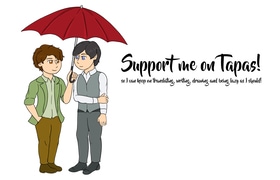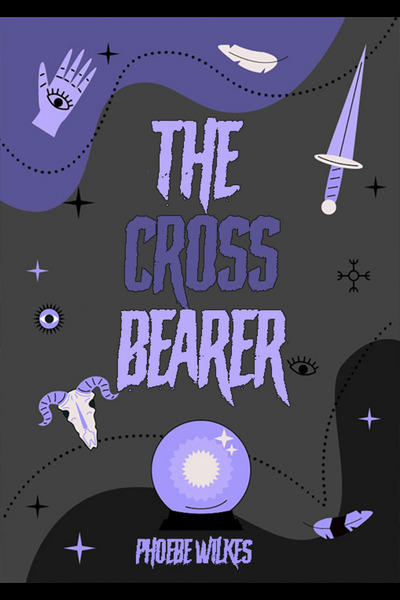The sensible thing would have been to go home once and for all, perhaps eat a quick breakfast to regain my strength, and then lie in bed for as many hours as possible, forgetting about the world and its demands. But that wasn’t an option within my reach.
I had barely managed to rest for half an hour on my cot when I remembered my appointment to attend Mass. Feeling as though my entire body weighed a ton, I had no choice but to get back on my feet and prepare myself to go.
Could I even skip it? No, it wasn’t a good idea. Claiming I didn’t feel well would attract too much attention, leading people to ask what was wrong. And since I was terrible at lying, I’d find myself in a bind trying to explain the supernatural part of what I had experienced.
It wasn’t just a matter of whether they’d believe me or think I was crazy; I simply wasn’t ready to accept it myself, let alone share it. So, hurriedly, because time was running out, I freshened up as best I could and put on my Sunday suit, all the while praying that no one would notice my exhausted appearance.
What could I do about the cross that had been bestowed upon me? I had left it on a small table in my room, silently wondering about its range. How far would I have to go for its supposed spell to pull me back toward it? Or perhaps toward the crossroads where I had first awakened?
I no longer remembered Delia’s exact words, but I doubted very much that if I carried the cross on my back and tried to roam the country, the Saint—or whatever it was—would idly watch as the only mortal in her procession walked away scot-free.
In the end, out of fear of returning to that starting point from which I had struggled so hard to escape, I placed the accursed cross in a briefcase, which I then slung over my shoulders before leaving the house.
It wasn’t exactly natural for someone with my line of work to be carrying such a thing any day of the week. It would look even stranger on a Sunday, hauling something so clearly unnecessary to church. But it was better for people to ask about an old briefcase than to inquire about a cross nearly as long as my forearm.
Fortunately, my concerns proved unfounded. Far from paying attention to the baggage I carried, the few people who noticed my presence in the church were more struck by my tired appearance.
“Did you sleep poorly?” Leandro, predictably, was the first to approach me out of concern. “You look terrible. If I’d known my grandmother’s eagerness to gossip would take such a toll on you, I would’ve insisted you stay the night.”
“I’m fine, don’t worry.” Seeing it was impossible to convince him, I admitted, “I just didn’t sleep very well last night.”
“Did something happen on your way back? This morning, one of the Deibe girls brought Zafiro back to us. They said they found him alone on one of their properties.”
I felt a pang of guilt when the donkey was mentioned. Not only had I lost him, but in my terror at the time, I hadn’t even thought of him again.
“Was he all right?” I asked anxiously, ignoring my friend’s first question.
“Yes, of course. The donkey’s fine, grazing peacefully.” After easing my worries, he pressed again, this time more concerned. “But what about you? Did something happen to you on the way back?”
There was no way to deny it. Leandro was smart, and more importantly, he knew me well. He understood I wouldn’t abandon a domestic animal—especially one that wasn’t even mine—without a very good reason. Faced with his insistence, what could I say? If I made up something about being attacked by wild boars, it would only alarm him further.
It wasn’t as if the truth—a ghostly procession—would have a lesser effect, but…
“Would you mind waiting until after Mass for me to explain?” I opted to ask, hoping to postpone the conversation, even for just half an hour.
“Of course, no problem. Anyway, it’s quite crowded here. It would be better to wait for the crowd to disperse if you prefer privacy.”
“I do, without a doubt.”
Since I’d have to explain eventually, I’d rather not have eavesdroppers overhear our conversation.
“But if you’d rather not talk about it later, that’s fine too,” Leandro continued calmly, watching my reaction. “I’m asking because I’m concerned, but you’re under no obligation to explain. Even if you don’t want to talk about it, just know I’m here if you ever need me.”
I felt relieved to hear that. Despite the years we had spent apart, Leandro hadn’t changed. He was still the same person—someone who looked out for his friends no matter what, always offering words of comfort and a willingness to help.
Socially distant as I had always been, I might have rejected his offer if he hadn’t long since earned my trust.
“Thank you,” I murmured finally. “But I don’t plan to keep it to myself. It’s just… it’s hard to put into words. Though I haven’t entirely ruled out that it might’ve been a bad dream.”
“We’ve got all the time in the world. No need to rush it.”
“That’s the problem. Maybe I don’t have as much time as you think.” I smiled as if it were a grim joke, but Leandro remained serious, clearly not understanding what I meant. “No, on second thought, I think it’s better if I tell you. Whether it’s reality or fiction, it won’t hurt to have a second opinion.”
“If that’s what you want…”
“Yes, but first I need to speak with the priest after the liturgy. After that, if you’re free, we can…”
“I’ll wait for you outside, by the usual bench.”
The bench he referred to was about twenty meters from the chapel—not close enough to be occupied by churchgoers eager to chat after Mass, but not so far as to be ignored in favor of a less conspicuous spot.
Leandro and I had used that bench, shaded by an oak tree, since our youth. It was often more of a hideout for escaping our sacristan duties than a place to rest before our families dragged us back into the church.
It goes without saying that the spot wasn’t exclusively ours; countless times, adults had beaten us to it. But regardless, it was as good a meeting point as any.
So, after greeting the other Malvedos and neighbors gathered around the church, I didn’t wait for the bells to ring before stepping inside. Always accompanied by a friend who seemed determined not to leave my side until the Sunday sermon ended, giving me no choice but to handle my private matters afterward.
The parish in question was a modest Romanesque-style structure. It lacked much ornamentation, and the few figurines adorning its corners and altarpieces clearly needed the expert touch of a restorer. There were only about a dozen benches in front of the main altar, but that was sufficient to accommodate all the faithful from the small village.
I positioned myself near the exit, though at a respectful distance from the large wooden doors. With my gaze fixed ahead, those who knew me and entered would offer little more than a quick "good morning" as they passed, assuming I was immersed in my own prayers.
Thus, with Leandro on my right and Doña Herminia on my left, I prepared to endure a mass that I had little genuine interest in attending. I did try, more than usual, to pay attention. But I felt different; the situation itself was different. On any other Sunday, my mind would have wandered, quietly questioning why I continued coming here when my beliefs leaned more toward agnosticism. Today, however, my thoughts were consumed by a profound concern for my future, leaving me unable to absorb a single word of Father Fonseca's sermon.
The mass felt interminable, the sermon uninspired. As soon as we were granted permission to leave in peace, I rose from my seat so quickly that it wouldn’t have surprised me if any of the Malvedo family thought I urgently needed to find the nearest latrine.
I wasn’t about to explain my haste. The only person I wanted to know was already informed. So, as soon as the priest stepped away from the pulpit, and after a brief apology for having to depart so early, I bid farewell to the family who had treated me so kindly these past few days and made my way to the sacristy.
Don Aurelio took a moment to receive me, stepping aside from the doorway to let me in. He had barely had time to remove his stole, and in a corner of the room, two altar boys were still in the process of shedding their ecclesiastical robes, pausing their childish anecdotes and usual jokes as soon as they noticed me.
No, it wasn’t my presence that silenced them. It was the priest’s gesture, signaling them to remain quiet. This time, I was the one to witness the cheerful atmosphere of the sacristy evaporate. Considering how Don Aurelio managed his parishes, I knew the result would have been the same no matter who had intruded upon his workspace. Our elderly priest was informal and warm with everyone, treating them like friends or relatives. But when it came to his place of work, he adhered strictly to decorum, ensuring that no indiscreet remarks—whether his own or from those under his guidance—were uttered in the presence of a parishioner.
The altar boys could play all the pranks they wanted outside the church premises, but within its walls, they were well-disciplined. And not only did they fall silent at his command, but they also hurried to put away the rest of their belongings before leaving, assuming we would need privacy.
"Eloy, what brings you here?" Don Aurelio greeted me with his usual warmth, though the surprise in his tone did not go unnoticed. "It’s been a long time since I’ve seen you in the sacristy."
It wasn’t a reproach, merely an observation. Despite my best efforts to not miss a single Sunday mass since returning to the village, it was true that I hadn’t taken the opportunity to visit the adjoining rooms of the parish. This made sense; beyond the usual courtesies, I had no real reason to speak with Don Aurelio.
Until now.
"I’ve been contemplating matters of spirituality lately," I began, slowly. "Perhaps it’s due to the unexpected and tragic events of the past few weeks, but I thought you might be able to help me clear my conscience."
"I can’t promise miracles. What happened to Joaquín is certainly a tragedy that no one was prepared for. And, having known him even a little, it’s inevitable to ponder what God’s plan might be for us mortals."
"Actually, it’s not so much God I’ve been thinking about."
"The Devil, then? Many people believe that when events like these occur, it’s because the devil is involved, either as a form of punishment for the victim’s loved ones or simply to do evil. But just as with believing that God intervenes in good events, I doubt either of them would bother meddling in earthly matters."
"No, it’s not the Devil either. I was thinking more about local myths and legends. While investigating, I’ve noticed some of the villagers mentioning a procession of lost souls..."
"Oh, that nonsense," the priest said, his tone dismissive. A moment ago, he had seemed to regret the lack of a chair to offer me, but now it appeared he’d decided that my topic was trivial and, while still courteous, intended to see me off quickly. "I’ve been hearing those stories since long before I settled in this parish. It seems those tales have been common gossip in this community since our great-grandparents’ time... perhaps even earlier."
"But you don’t believe in them, and you’ve never seen anything like it yourself."
"I’ve been here for over thirty years, moving between parishes but never straying far from these mountains," Don Aurelio explained with a weary tone, as if this was far from the first time he’d shared this story. "Many times, night has caught me on the roads, guiding myself with only the faint light of lanterns and a full moon. And never, under any circumstances, have I encountered anything like what people describe as ‘apparitions’ or ‘wandering souls.’ Wolves, boars, and other wild animals? Yes, I’ve heard plenty of those. More than once, I had to change my route or accept shelter at a parishioner’s home for fear of physical danger on my way back. But no, I’ve never seen ghosts. Not dead ones, at least."
His words should have been enough. He was implying that his decades of experience in the area without encountering anything suspicious should suffice to dismiss such conjectures.
But they weren’t. Not for me.











![Chapter 7 [Part 1]](https://us-a.tapas.io/sa/79/d4b3eac9-3f3e-4a87-aa53-76ef12ed6b3b.jpg)
Comments (0)
See all